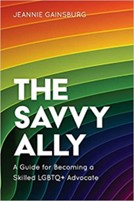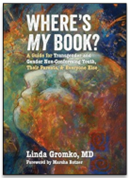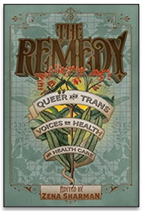Books on LGBTQIA+ Topics in Medicine
Honor and celebrate Pride Month and beyond by reading these books recommended by AACOM staff and the osteopathic medical education community!
The Savvy Ally: A Guide for Becoming a Skilled LGBTQ+ Advocate
Jeannie Gainsburg’s enjoyable, humorous, encouraging and easy to understand guidebook about how to be an ally contains practical and useful tools for LGBTQIA+ advocacy, including current and relevant information on identities and LGBTQIA+ language, LGBTQIA+ etiquette and techniques for respectful conversations, actions for creating more LGBTQIA+ inclusive spaces and recommendations for self-care and sustainable allyship. The Savvy Ally, intended to create more confident, active allies who are effective advocates for change, will be useful for teachers, counselors, social workers, nurses, medical technicians and college professors.
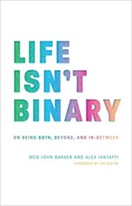 Life Isn't Binary: On Being Both, Beyond, and In-Between
Life Isn't Binary: On Being Both, Beyond, and In-Between
Much of society's thinking operates in a highly rigid and binary manner; something is good or bad, right or wrong, a success or a failure and so on. Challenging this limited way of thinking, this ground-breaking book by Meg-John Barker and Alessandra Iantaffi explores how non-binary methods of thought can be applied to all aspects of life and offers new and greater ways of understanding ourselves and how we relate to others. Using bisexual and non-binary gender experiences as a starting point, this book addresses the key issues with binary thinking regarding our relationships, bodies, emotions, wellbeing and our sense of identity and sets out a range of practices that may help us to think in more non-binary, both/and or uncertain ways. A truly original and insightful piece, this guide encourages reflection on how we view and understand the world we live in and how we all bend, blur or break society's binary codes.
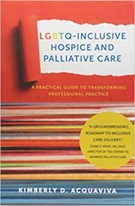
LGBTQ-Inclusive Hospice and Palliative Care: A Practical Guide to Transforming Professional Practice
Kimberly D. Acquaviva has written the only handbook for hospice and palliative care professionals looking to enhance their care delivery or programs with LGBTQIA+-inclusive care. Anchored in evidence, extensively referenced and written in clear, easy-to-understand language, LGBTQ-Inclusive Hospice and Palliative Care provides clear, actionable strategies for hospice and palliative physicians, nurses, social workers, counselors and chaplains.
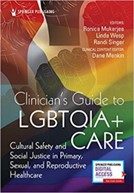
Clinician's Guide to LGBTQIA+ Care: Cultural Safety and Social Justice in Primary, Sexual, and Reproductive Healthcare
This unique text, edited by Randi Singer, PhD, MSN, MEd, CNM, RN; Ronica Mukerjee, DNP, MSN, FNP-BC, MsA, Lac; and Linda Wesp, PhD, MSN, FNP-C, RN, and coedited by Dane Menkin, MSN CRNP, provides a framework for delivering culturally safe clinical care to LGBTQIA+ populations filtered through the lens of racial, economic and reproductive justice. It focuses strongly on the social context in which we live, one where multiple historical processes of oppression continue to manifest as injustices in the healthcare setting and beyond. Encompassing the shared experiences of a diverse group of expert healthcare practitioners, this book offers abundant examples, case studies, recommendations and the most up-to-date guidelines available for treating LGBTQIA+ patient populations. This text helps health professionals incorporate safe and culturally appropriate language into their care, understand the roots and impact of stigma, address issues of health disparities and recognize and avoid racial or LGBTQIA+ microaggressions. Specific approaches to care include chapters on sexual healthcare, perinatal care and information about pregnancy and postpartum care for transgender and gender-expansive people.
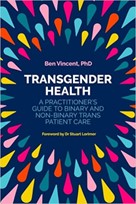
Transgender Health: A Practitioner’s Guide to Binary and Non-Binary Trans Patient Care
This book by Benjamin Vincent, PhD, shows healthcare and medical practitioners how to deliver excellent primary and secondary care to gender diverse patients. A British Medical Association Medical Book Awards finalist, this guide provides accessible and practical advice on tailoring the social and ethical aspects of practice to the needs of each individual. Beyond setting out how clinical procedures should work for gender reassignment, it explains how to use language and pronouns in a respectful way, provides information on transgender services and resources, and offers insights into the challenges commonly faced by transgender people in both medical and social contexts. Based on cutting edge research and the lived experience of the author as a non-binary person, this is essential reading for all those working to meet the needs of transgender people in healthcare settings.
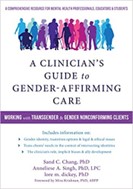 A Clinician's Guide to Gender-Affirming Care: Working with Transgender and Gender Nonconforming Clients
A Clinician's Guide to Gender-Affirming Care: Working with Transgender and Gender Nonconforming Clients
Written by Sand C. Chang, PhD; Anneliese A. Singh, PhD LPC; and lore m. dickey, PhD, three psychologists who specialize in working with the transgender and gender nonconforming population, this important book draws on the perspective that there is no one-size-fits-all approach for working with transgender and gender nonconforming patients. It provides up-to-date information on language, etiquette and appropriate communication and conduct, and discusses the history, cultural context and ethical and legal issues that can arise in working with gender-diverse individuals in a clinical setting. It also discusses informed consent approaches that call for a shift in the role of the mental health professional in the position of assessment and referral for the purposes of gender-affirming medical care (such as hormones, surgery and other procedures). As changes in recent transgender healthcare and insurance coverage have provided increased access for a broader range of patients, it is essential to understand transgender and gender nonconforming individuals' different needs. This book provides practical exercises and skills you can use to help transgender and gender nonconforming patients thrive..
Linda Gromko, MD, is a board-certified family physician who has worked with the transgender community for years. In this book, she explains the basics of gender identity, sexual orientation, puberty, puberty blockers, hormone treatments and gender affirming surgeries. She shares years of her patients’ wisdom and practical information on getting through every day in the best way possible—from coming out to parents, to school issues, to coping with depression, to love and sex.
The Remedy, edited by Zena Sharman, invites writers and readers to imagine what we need to create healthy, resilient and thriving LGBTQIA+ communities. This anthology is a diverse collection of real-life stories from queer and trans people about their own healthcare experiences and challenges, from gay men living with HIV who remember the systemic resistance to their healthcare needs, to a lesbian couple dealing with cancer, to young trans people who struggle to find healthcare professionals who treat them with dignity and respect. The book also includes essays by healthcare professionals, activists and leaders discussing the challenges, politics and opportunities surrounding LGBTQIA+ health issues.
AACOM thanks Aisha Ali, MHRM, AACOM research analyst; Catherine Lewis Saenz, communications coordinator at the Rocky Vista University College of Osteopathic Medicine (RVUCOM); and RVU’s Frank Ritchel Ames Memorial Library for sharing these recommendations.
Anything we missed? Share your Pride Month reading list by tagging us on X at @AACOMmunities.

